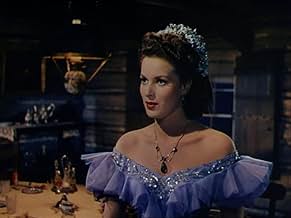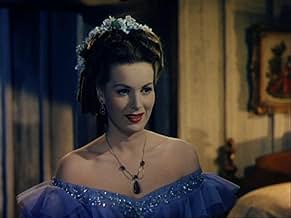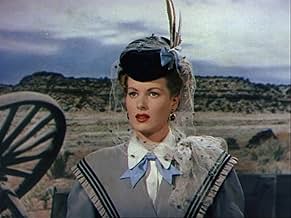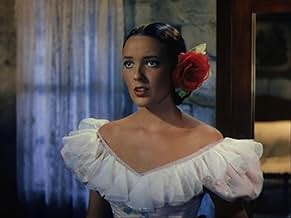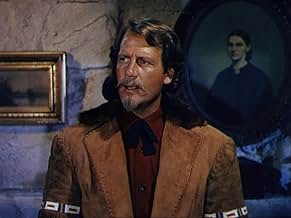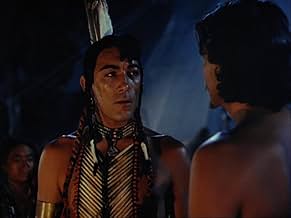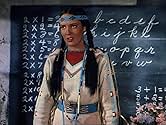Buffalo Bill
- 1944
- Tous publics
- 1h 30m
IMDb RATING
6.4/10
1.8K
YOUR RATING
The story of William "Buffalo Bill" Cody, legendary westerner, from his days as an army scout to his later activities as owner of a Wild West show.The story of William "Buffalo Bill" Cody, legendary westerner, from his days as an army scout to his later activities as owner of a Wild West show.The story of William "Buffalo Bill" Cody, legendary westerner, from his days as an army scout to his later activities as owner of a Wild West show.
- Awards
- 2 wins total
Carl Andre
- Trooper
- (uncredited)
Arthur Aylesworth
- Pool Player Debunking Cody
- (uncredited)
Evelyn Beresford
- Queen Victoria
- (uncredited)
Edward Biby
- Sergeant
- (uncredited)
Sidney Blackmer
- Theodore Roosevelt
- (uncredited)
Billy Bletcher
- Short Man
- (uncredited)
William A. Boardway
- Washington DC Cafe Customer
- (uncredited)
Featured reviews
A lavish Technicolor potboiler shot by Leon Shamroy, who later collected that year's Oscar for colour cinematography for 'Wilson'; although here the most spectacular scenes are obviously the work of Otto Brower's second unit, with the close ups of the leads shot back at the studio.
It commendably takes the side of the American Indian (represented here by Anthony Quinn and Linda Darnell, the latter wearing lots of makeup and the former very little of anything) against the vested financial interests back East, and also gives the plight of the buffalo a nod.
Maureen O'Hara thought her first western "would be forgettable, but it turned out to be one of the biggest moneymakers 20th Century-Fox had that year" and that Joel McCrea although "a very nice man, a good actor, but not rugged like Duke or Brian Keith". He's likeable, however and as usual gives the film heart.
It commendably takes the side of the American Indian (represented here by Anthony Quinn and Linda Darnell, the latter wearing lots of makeup and the former very little of anything) against the vested financial interests back East, and also gives the plight of the buffalo a nod.
Maureen O'Hara thought her first western "would be forgettable, but it turned out to be one of the biggest moneymakers 20th Century-Fox had that year" and that Joel McCrea although "a very nice man, a good actor, but not rugged like Duke or Brian Keith". He's likeable, however and as usual gives the film heart.
All the action in this movie is mostly towards the beginning-the indian vs calvary battle which bestows the famous reputation of indian-fighter on the main character, Buffalo Bill. The battle scenes are enhanced by the large numbers of real indians who were wearing real eagle feathers, and even the participation of a young indian woman in the battle(a similarity to the Custer battle, where indian women also participated). Staging a battle with large numbers of horses in the middle of a river must have been challenging. The indians would have probably chosen a much better site, but the storyline said they were in a hurry to get through a vital pass and so the clash.Buffalo Bill summarized his feelings for the indians by saying,"they were all my friends." the rest of the movie focuses on his personal life and tragedies. His final speech to his fans gave the viewer a feel for the about-to-be-lost glory and grandeur of the old west.It made me think of how far beyond anything C.B. DeMille ever did the true west really was.
"Buffalo Bill" is a highly romanticized picture of 'Buffalo' Bill Cody. While IMDb is correct that most of the things in this biopic are actually based on Cody's real-life exploits, most of the relationship between him and his wife was pure hooey. Sadly, there was no great love in Cody's life--or if there was, it wasn't his wife! Most of their life was spent apart by his choice--and there were other women in his life. But, this image of Bill would not have gotten past censors back in 1944, so the studio fictionalized this aspect of his life. The rest, however, is reasonably accurate--something that surprised me as I watched the film. He was a scout for the US Army in the west, he fought in the Indian wars and he did start up an incredibly successful Wild West Show.
Another aspect of the film that struck me was its treatment of the American Indians--particularly the Cheyenne. It was odd, as the major roles of the 'Indians' were played by Linda Darnell and Anthony Quinn!!! This insensitivity was pretty much the way American Indians were portrayed in American films through the 1950s. HOWEVER, despite this insensitivity, the film did correctly assert that the Indian wars were forced on these people due to how they were treated by the government. And, in this way, the film was much more balanced than many westerns of the day.
Overall, a somewhat inaccurate film that looked nice and featured the excellent acting, as usual, by Joel McCrea. Worth seeing--just not exactly the Gospel! And, the final line of the film might make you throw up--so when that little kid in the audience stands up, PLUG YOUR EARS!!!
By the way, the film made one HUGE mistake. General Sherman NEVER said "The only good Indian is a dead Indian". This quote was actually from General Sheridan--though it's not exactly what he said. When he was asked what a good Indian was like, he said very succinctly "...a dead one".
Another aspect of the film that struck me was its treatment of the American Indians--particularly the Cheyenne. It was odd, as the major roles of the 'Indians' were played by Linda Darnell and Anthony Quinn!!! This insensitivity was pretty much the way American Indians were portrayed in American films through the 1950s. HOWEVER, despite this insensitivity, the film did correctly assert that the Indian wars were forced on these people due to how they were treated by the government. And, in this way, the film was much more balanced than many westerns of the day.
Overall, a somewhat inaccurate film that looked nice and featured the excellent acting, as usual, by Joel McCrea. Worth seeing--just not exactly the Gospel! And, the final line of the film might make you throw up--so when that little kid in the audience stands up, PLUG YOUR EARS!!!
By the way, the film made one HUGE mistake. General Sherman NEVER said "The only good Indian is a dead Indian". This quote was actually from General Sheridan--though it's not exactly what he said. When he was asked what a good Indian was like, he said very succinctly "...a dead one".
"Buffalo Bill" (1944) is a a fictionalized biopic of the life of "Buffalo Bill" Cody (Joel McCrea) who worked as a scout for the US Army and later traveled East, establishing his Wild West show and becoming an international sensation.
Director William Wellman and a writer worked for months on a script that told the true story of Buffalo Bill, including that he was a drunk, a charlatan and an unfaithful husband, but -- ultimately -- they said they couldn't destroy the legend, so they destroyed their screenplay and hired writers to write the myth.
This explains people's criticism of this classic Western, but if you can accept that it's more myth than fact it's quite entertaining, especially considering the time it came out. Several things surprised me about this movie. For one, it clearly takes a pro-Indian stance and this was a full two decades before it become "hip" to do so. Secondly, the depiction of the Indians is good and they used real Natives as peripheral characters. Although Anthony Quinn plays Yellow Hand, he looks convincing, probably because he had Native blood.
The Cheyenne and Sioux are portrayed in a noble manner as people protecting their way of life from the Europeans who don't keep their word and slaughter the buffalo en masse for no logical reason. There's a stunning scene when the Natives confront the cavalry and Yellow Hand stands up to Buffalo Bill. After the battle, Bill holds the body of an Indian woman he knew (Linda Darnell) and someone asks, "A friend of yours?" Bill sadly responds, "They were all my friends."
Interestingly, a black boy is shown in one of the carnival scenes and even has a line, which is notable considering this was a full two decades before the Civil Rights movement.
Some facts: The character of Yellow Hand was taken from the real-life Cheyenne chief Yellow Hair whom Cody shot, stabbed and scalped after Little Big Horn. As already noted, the movie is a whitewash and omits the fact that Cody sued his wife, Louisa Frederici (Maureen O'Hara), for divorce in 1905. They had four kids, but two died when they were young.
Some criticize the way Bill stands at attention while prince Yellow Hand walks in half-naked wherein Bill lifts his hand and says "How." My Response: Didn't the Europeans (sometimes) talk with half-naked Natives when they met, which was fitting since it was the heat of the summer? So what's the problem with depicting this in the film? And wasn't "Howgh" an actual greeting with some tribes? It was. "Hau" was a greeting of the Lakota/Dakota Sioux, which is one of the two tribes depicted in the film; in fact, this greeting is still used by Sioux people today. Other tribes had similar words for greetings. As such, what's wrong with depicting this in the film, particularly since the actors pulled it off? Besides, at that time in the early 40s it hadn't become the stereotypical cliché that it later became.
Bottom Line: Yes, there's some roll-your-eyes myth-making in "Buffalo Bill" (like the kid with crutches at the end), but the story maintains your attention and there's a lot of rollicking entertainment, especially the exciting Cavalry vs. Indians segments. Beyond that, McCrea and Quinn are great, the locations are spectacular, the women are beautiful and the Natives are presented in a respectable and believable way, particularly considering the picture was made in the early 40s.
The film runs 89 minutes and was shot in Utah, Arizona and Montana.
GRADE: B+
ADDITIONAL COMMENTARY: "Buffalo Bill" was one of the first pro-Native Westerns, which came into vogue by the 60s/70s. This is a good thing because it's important to see the other side of the Indian Wars, but let's not whitewash history. The Black Hills were first inhabited by the Arikara tribe followed by the Cheyenne, Kiowa, Pawnee and Crow. These tribes were defeated by the Sioux, who migrated out of the Minnesota woods (actually chased out by their enemies, the Ojibwa and Chippewa). The Sioux then used their superior numbers to take the Black Hills from the other tribes that resided in the area.
I point this out because Native Americans were guilty of the very thing we accuse European settlers/soldiers/prospectors of doing -- invading lands that weren't theirs.
Furthermore, applying modern thinking is a dishonest tool when inspecting the relations between Native and settler/soldier/prospector.
We always hear of the injustices committed by the US Army or settlers and get a handful of examples: Wounded Knee, Bear River and Sand Creek. Yet we never hear the other side of what caused these events nor do we hear of the atrocities of Natives committed against New Americans. For instance, we never hear of the Dakota "War" of 1862 (Santee Sioux went on the war path and murdered between 600-800 white settlers, which constituted the largest death toll inflicted upon American civilians by an enemy force until 9/11), The Ward Massacre, The Nez Perce uprising which killed dozens of settlers in Idaho and Wyoming, and the Massacre at Fort Mims. We never hear of the countless innocent settlers who were murdered by roaming bands of young "warriors": While a chief was signing a peace treaty on the tribe's behalf they were out robbing, raping and murdering.
I'm just saying that it's easy to be pro-Native sitting on the comfort of your sofa, but not so much when you and your loved ones are threatened with slaughter.
The Europeans wanted the Native's land and resources while the Indians wanted the technology of the Europeans. Both sides used treaties to make peace while still trying to get what they wanted when war was too expensive. Both sides made war when they felt no other option.
I love Native American culture, but the whitewashing of Native atrocities and this revisionist history stuff is dishonest and unbalanced.
Director William Wellman and a writer worked for months on a script that told the true story of Buffalo Bill, including that he was a drunk, a charlatan and an unfaithful husband, but -- ultimately -- they said they couldn't destroy the legend, so they destroyed their screenplay and hired writers to write the myth.
This explains people's criticism of this classic Western, but if you can accept that it's more myth than fact it's quite entertaining, especially considering the time it came out. Several things surprised me about this movie. For one, it clearly takes a pro-Indian stance and this was a full two decades before it become "hip" to do so. Secondly, the depiction of the Indians is good and they used real Natives as peripheral characters. Although Anthony Quinn plays Yellow Hand, he looks convincing, probably because he had Native blood.
The Cheyenne and Sioux are portrayed in a noble manner as people protecting their way of life from the Europeans who don't keep their word and slaughter the buffalo en masse for no logical reason. There's a stunning scene when the Natives confront the cavalry and Yellow Hand stands up to Buffalo Bill. After the battle, Bill holds the body of an Indian woman he knew (Linda Darnell) and someone asks, "A friend of yours?" Bill sadly responds, "They were all my friends."
Interestingly, a black boy is shown in one of the carnival scenes and even has a line, which is notable considering this was a full two decades before the Civil Rights movement.
Some facts: The character of Yellow Hand was taken from the real-life Cheyenne chief Yellow Hair whom Cody shot, stabbed and scalped after Little Big Horn. As already noted, the movie is a whitewash and omits the fact that Cody sued his wife, Louisa Frederici (Maureen O'Hara), for divorce in 1905. They had four kids, but two died when they were young.
Some criticize the way Bill stands at attention while prince Yellow Hand walks in half-naked wherein Bill lifts his hand and says "How." My Response: Didn't the Europeans (sometimes) talk with half-naked Natives when they met, which was fitting since it was the heat of the summer? So what's the problem with depicting this in the film? And wasn't "Howgh" an actual greeting with some tribes? It was. "Hau" was a greeting of the Lakota/Dakota Sioux, which is one of the two tribes depicted in the film; in fact, this greeting is still used by Sioux people today. Other tribes had similar words for greetings. As such, what's wrong with depicting this in the film, particularly since the actors pulled it off? Besides, at that time in the early 40s it hadn't become the stereotypical cliché that it later became.
Bottom Line: Yes, there's some roll-your-eyes myth-making in "Buffalo Bill" (like the kid with crutches at the end), but the story maintains your attention and there's a lot of rollicking entertainment, especially the exciting Cavalry vs. Indians segments. Beyond that, McCrea and Quinn are great, the locations are spectacular, the women are beautiful and the Natives are presented in a respectable and believable way, particularly considering the picture was made in the early 40s.
The film runs 89 minutes and was shot in Utah, Arizona and Montana.
GRADE: B+
ADDITIONAL COMMENTARY: "Buffalo Bill" was one of the first pro-Native Westerns, which came into vogue by the 60s/70s. This is a good thing because it's important to see the other side of the Indian Wars, but let's not whitewash history. The Black Hills were first inhabited by the Arikara tribe followed by the Cheyenne, Kiowa, Pawnee and Crow. These tribes were defeated by the Sioux, who migrated out of the Minnesota woods (actually chased out by their enemies, the Ojibwa and Chippewa). The Sioux then used their superior numbers to take the Black Hills from the other tribes that resided in the area.
I point this out because Native Americans were guilty of the very thing we accuse European settlers/soldiers/prospectors of doing -- invading lands that weren't theirs.
Furthermore, applying modern thinking is a dishonest tool when inspecting the relations between Native and settler/soldier/prospector.
We always hear of the injustices committed by the US Army or settlers and get a handful of examples: Wounded Knee, Bear River and Sand Creek. Yet we never hear the other side of what caused these events nor do we hear of the atrocities of Natives committed against New Americans. For instance, we never hear of the Dakota "War" of 1862 (Santee Sioux went on the war path and murdered between 600-800 white settlers, which constituted the largest death toll inflicted upon American civilians by an enemy force until 9/11), The Ward Massacre, The Nez Perce uprising which killed dozens of settlers in Idaho and Wyoming, and the Massacre at Fort Mims. We never hear of the countless innocent settlers who were murdered by roaming bands of young "warriors": While a chief was signing a peace treaty on the tribe's behalf they were out robbing, raping and murdering.
I'm just saying that it's easy to be pro-Native sitting on the comfort of your sofa, but not so much when you and your loved ones are threatened with slaughter.
The Europeans wanted the Native's land and resources while the Indians wanted the technology of the Europeans. Both sides used treaties to make peace while still trying to get what they wanted when war was too expensive. Both sides made war when they felt no other option.
I love Native American culture, but the whitewashing of Native atrocities and this revisionist history stuff is dishonest and unbalanced.
This is an entertaining chronicle of the noted frontier explorer . A simple story of William "Buffalo Bill" F. Cody (Joel McCrea) , legendary westerner , whose adventures made him a hero , this is a fictionalized account of the life and career from his days as an army scout or frontier hunter , his marriage to Louisa Frederici Cody (Maureen O'Hara) , to his later activities as showmanship . There happen sad events , as a lot of Buffalos had been exterminated , as hordes of eager hunters pursued the Buffalo herds in mass attacks and newspapers publicized special excursions to Buffalo grounds , including ¨the Great Russian Duke hunt¨ . Bill participated but also denounced these deeds . His hat along with a small part of his scalp was shot off by the Sioux Indians with their chief Crazy Horse and Cheyennes tribes , as in 1869 took place the action leading to a stunning victory over the Cheyenne at Summit Springs , Kansas . And there occurred his fight against ¨Yellow Hand¨ (Anthony Quinn) . Bill inspired dime novelist Ned Buntline (Thomas Mitchell) to write a serial featuring him and he began escorting hunting parties for rich men . The movie describes his rising and fall when Bill assaults an editor , denounced fraud , evicted from Astor ; though Bill , finally , accused Monied interests of instigating Indian wars . After winning a Congressional medal of Honor for bravery , then Cody left scouting and headed East to begin a theatrical career . Bill , subsequently , becomes a wealthy owner of a Wild West show , as a showman made him a legend.
Good biographic movie portraying the famous Wild West role . Well and lavishly directed by William A. Wellman with a great all-star-cast as Joel McCrea , Maureen O'Hara , Anthony Quinn , Linda Darnell , Edgar Buchanan , among others . Being emotionally right on the mark and there's precious action . The picture has an excellent Mise-En-scene with spectacular battles , big production design , thrilling score by David Buttolph and spectacular cinematography by Leon Shamroy .
During his 72 years Bill (1846-1917) enjoyed one of the greatest careers in Western history . Bill started early , by the age of 14 , he had already worked as drover , prospector , trapper and Pony Express rider . While grading track , and hunting Buffalos for the Kansas Pacific Railroad , after the Civil War , 21-year-old William F. Cody allegedly received the nickname ¨Buffalo Bill¨ after bringing down 11 of the beasts with 12 shots . Like his friend , ¨Will Bill Hickock¨ whom he met during the Civil war , Cody scouted for the Union in its wartime campaign against the Plains tribes and continued operating against Indians in the service of General Sheridan , General Carr's 5th Cavalry and other commanders . The dime novels and other popular entertainments of the time had already begun to be filled with rather fanciful accounts of Cody's exploits . And coming west on the newly completed transcontinental railroad . Shortly thereafter, the celebrated scout moved to Fort McPherson , Nebraska . In 1875-1876 he returned briefly to scouting in the Sioux Wars where he distinguished himself yet again . From then until his death in 1917 , Bill divided his time between ranching and producing Wild West Shows , in which Bill was cheered by crowds of enthusiastic citizens that made him wealthy and secured his everlasting fame .
Other films about ¨Buffalo Bill¨ are the followings : ¨Battling with Buffalo Bill¨ (1931) by Ray Taylor with Tom Tyler , ¨The Plainsman¨ (1936) by Cecil B. De Mille with Gary Cooper , James Ellison , Jean Arthur , ¨Buffalo Bill in Tomahawk Territory¨ by Bernard Ray with Clayton Moore , Chief Thundercloud , ¨Buffalo Bill rides again ¨ (1947) by Bernard Ray with Richard Arlen , ¨Buffalo Bill¨ by Mario Costa with Gordon Scott , Mario Petri and the historical pastiche as well as perennial underrated ¨Buffalo Bill and the Indians¨ (76) by Robert Altman with Paul Newman who appears as a charlatan and shameless exemplar of encroaching imperialism .
Good biographic movie portraying the famous Wild West role . Well and lavishly directed by William A. Wellman with a great all-star-cast as Joel McCrea , Maureen O'Hara , Anthony Quinn , Linda Darnell , Edgar Buchanan , among others . Being emotionally right on the mark and there's precious action . The picture has an excellent Mise-En-scene with spectacular battles , big production design , thrilling score by David Buttolph and spectacular cinematography by Leon Shamroy .
During his 72 years Bill (1846-1917) enjoyed one of the greatest careers in Western history . Bill started early , by the age of 14 , he had already worked as drover , prospector , trapper and Pony Express rider . While grading track , and hunting Buffalos for the Kansas Pacific Railroad , after the Civil War , 21-year-old William F. Cody allegedly received the nickname ¨Buffalo Bill¨ after bringing down 11 of the beasts with 12 shots . Like his friend , ¨Will Bill Hickock¨ whom he met during the Civil war , Cody scouted for the Union in its wartime campaign against the Plains tribes and continued operating against Indians in the service of General Sheridan , General Carr's 5th Cavalry and other commanders . The dime novels and other popular entertainments of the time had already begun to be filled with rather fanciful accounts of Cody's exploits . And coming west on the newly completed transcontinental railroad . Shortly thereafter, the celebrated scout moved to Fort McPherson , Nebraska . In 1875-1876 he returned briefly to scouting in the Sioux Wars where he distinguished himself yet again . From then until his death in 1917 , Bill divided his time between ranching and producing Wild West Shows , in which Bill was cheered by crowds of enthusiastic citizens that made him wealthy and secured his everlasting fame .
Other films about ¨Buffalo Bill¨ are the followings : ¨Battling with Buffalo Bill¨ (1931) by Ray Taylor with Tom Tyler , ¨The Plainsman¨ (1936) by Cecil B. De Mille with Gary Cooper , James Ellison , Jean Arthur , ¨Buffalo Bill in Tomahawk Territory¨ by Bernard Ray with Clayton Moore , Chief Thundercloud , ¨Buffalo Bill rides again ¨ (1947) by Bernard Ray with Richard Arlen , ¨Buffalo Bill¨ by Mario Costa with Gordon Scott , Mario Petri and the historical pastiche as well as perennial underrated ¨Buffalo Bill and the Indians¨ (76) by Robert Altman with Paul Newman who appears as a charlatan and shameless exemplar of encroaching imperialism .
Did you know
- TriviaMuch of Cody's life as depicted in the film was true: He did fight to the death with Chief Yellow Hand and he did receive the Congressional Medal of Honor (although it was rescinded in 1917 because he was not in the army); his son, Kit Carson Cody, did die (but of scarlet fever, not diphtheria); his wife (not the daughter of a senator) had three other children.
- GoofsEarly in the film, Sergeant Chips McGraw refers to Buffalo Bill's "big Springfield" rifle but Bill is armed with an 1866 Winchester rifle in this scene.
- Quotes
William F. 'Buffalo Bill' Cody: What killed my son?
Doctor: Diptheria.
William F. 'Buffalo Bill' Cody: What's that?
Doctor: A germ.
William F. 'Buffalo Bill' Cody: Where does it come from?
Doctor: Water systems... and sewage. It's a crowd disease. A disease of civilization.
- ConnectionsEdited from Sur la piste des Mohawks (1939)
- How long is Buffalo Bill?Powered by Alexa
Details
- Release date
- Country of origin
- Language
- Also known as
- Buffalo Bill, der weiße Indianer
- Filming locations
- Production company
- See more company credits at IMDbPro
- Runtime
- 1h 30m(90 min)
- Aspect ratio
- 1.37 : 1
Contribute to this page
Suggest an edit or add missing content

